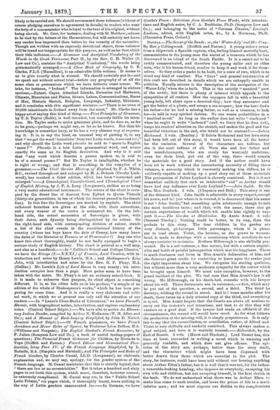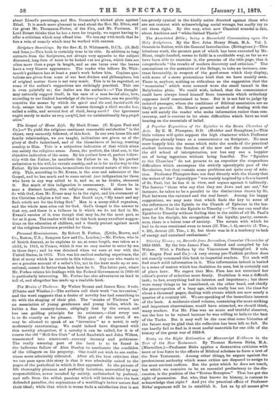NovEr.s.—The Secret of the Sands; or, the' Water-Lily' and Her
Crew. By Har: j Coiling wood. (Griffith and Ferran.) A young sailor rateues from a shipwreck a Spanish captain, who, feeling himself mortally hurt, communicates to the young man the secret of a treasure which he has discovered in an island of the South Pacific. It is a secret not to be rashly communicated, and therefore the young sailor and an older man, who is his bosom-friend, resolve to keep it and work it for them- selves. So they order a yacht to be built, for a crew of two, which is to stand any kind of weather. The "lines" and general construction of this craft are described in details which we are unhappily unable to criticise. Equally minute is the description of the navigation of the Water-Lily,' when she is built. This is the strictly " nautical " part of the novel; but there is plenty of interest which appeals to the sympathies of all readers. How the voyagers fall in with a beautiful young lady, left alone upon a deserted ship ; how they encounter and get the better of a pirate, and escape a sea-serpent ; how the hero find s his father—for he had a missing father, as well as a treasure, to look for—is told in very spirited fashion. No one wants probabilities in a " nautical novel." As long as the author does not write " starboard " when he ought to write " larboard" (and we fancy that ho does not), keeps his readers' attention on the stretch, and makes the good and the beautiful victorious in the end, who would not be content ?—Salvia Richmond. 3 vole. (Bentley.) If Salvia Richmond and her love-story had been left out of this story, it would have been all the better for the omission. Several of the characters are tedious, but she is the most tedious of all. Were she and her father and the scandalmongers, who are surely too wantonly malicious, even for their kind, put out of the way, there would remain the materials for a good story. And if the author •could have been set to work without the encumbering necessity of filling those volumes, a necessity which is constantly making him diffuse, he is evidently capable of making up a good story out of these materials The personation of Julian Leyland is cleverly contrived. But is it not somewhat unlikely that such an intolerable " cad " as Archer should have had any influence over Lady Leyland 7—John Smith. By the Hon. Mrs. Cradock. 2 vols. (Chapman and Hall.) This story is one of the thinnest kind. John Smith is admirable in every respect, except his name, and lo! just where it is wanted, it is discovered that his name is not "John Smith," but something quite aristocratic enough to suit the most fastidious taste ; and that, with the name, there also go certain expectations of wealth which wil enable him rightly to sup- port it.—The Garden at Monkhohne. By Annie Armit. 3 vols. (Samuel Tinsley.) Nothing could be better, in its way, than the prelude to this story. The four children in the garden aro very distinct, picturesque little personages, whom it is pleas- ant to read about. Violet, the heroine, as she grows to woman- hood, is made to developo with a consistency which novelists do not always contrive to maintain. Redfern Hilborough is also skilfully pre- sented. He is a self-torturer, a fine nature, but with a certain ungoni- ality and habit of painful introspection which mar his happiness. There is much freshness and force in Miss Armies delineation of him, and she deserves great credit for contriving to leave upon the reader just the right impression about him. We recognise his sterling qualities, but without more than a very moderate sympathy for the sorrow which he brought upon himself. We must take exception, however, to the grand incident of the plot. We feel sure that Miss Armit's law is all wrong. Mr. Hilborough, on his death-bed, consults with his lawyer about his will. Three documents are in existence,—a first, which may be put out of the question, a second, and a third. The third he destroys, wishing the second to stand. And lo ! some months after his death, there turns up a duly attested copy of the third, and everything is urset. Miss Armit forgets that the Courts are above all anxious to carry out the testator's real intentions, and• that to do this they will venture on a good deal. If the lawyer had made an affidavit of the circumstances, the second will would have stood. As for what follows the production of the missing will, it is simply preposterous. It is only fair to say that the reconciliation, or conciliation rather, of Alfred and Violet is very skilfully and tenderly contrived. This always makes a good subject, and here it is worthily treated.—Kelverdule, by the Earl of Desert. 3 vols. (Hurst and Blackett.) Lord Desert has, this time at least, succeeded in writing a novel which is amusing and generally readable, and which does not give offence. The epi- sodes of the story are, perhaps, better than the story itself, and the characters which might have been dispensed with better drawn than those which are essential to the plot. The story, for instance, could have been told without our hearing anything about Arthur Elton's father, but it is well that it was not, for the father, a venerable-looking humbug, who imposes on everybody, excepting his own wife and children, but not excepting himself, is the best sketch in the book. We do not understand what there was in Arthur Elton to make him come to such trouble, and leave the prizes of life to a much inferior man ; and we must express our dislike to the complications about Lionel's parentage, and Mrs. Dormerby's wicked plots against Ethel. It is much more pleasant to read about the Rev. Mr. Elton, and the great Mr. Thompson-Porter, of the Firs, and Mr. Fuziman. If Lord Desert thinks that he has a turn for tragedy, we regret having to offer a criticism which may offend him. We can say with truth that he has a vein of comedy which may be worked with success.







































 Previous page
Previous page